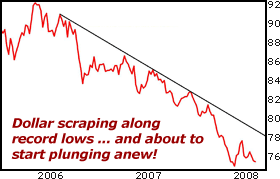The Single Best Investment for 2008!
Commodities / Gold & Silver Stocks Feb 07, 2008 - 10:26 AM GMT Larry Edelson writes: In late 1865, to cover the staggering costs of the Civil War ... to bail out financial institutions on the verge of bankruptcy ... and to help stem the financial losses in towns and municipalities ... Washington issued tidal waves of government bonds, to the tune of almost $29.5 billion per day.
Larry Edelson writes: In late 1865, to cover the staggering costs of the Civil War ... to bail out financial institutions on the verge of bankruptcy ... and to help stem the financial losses in towns and municipalities ... Washington issued tidal waves of government bonds, to the tune of almost $29.5 billion per day.
Money was printed with reckless abandon, and inflation shot to the moon.
As a result, the Confederate and Union currencies lost so much value that a pair of boots cost $2,361 in today's dollars. Butter was the equivalent of $177 per pound today.
No one wanted to hold U.S. paper currency, period. Investors from all walks of life opted instead for real money, gold.
Between 1861 and 1863, the price of gold shot up from $20.67 to more than $35 an ounce, a 75% gain ...
In 1864, gold exploded another 52% to $53.35, or $800 in today's dollars ...
It went even higher, nearly tripling to $162.50 on September 24, 1869. That's $2,252 an ounce in today's dollars!
Since then, 24 U.S. presidents have come and gone, yet gold has never fallen back below its pre-Civil War level (once you adjust for inflation). Clearly, the characters have changed, but the song remains the same. In fact ...
 |
| In the 1860s, inflation and gold both soared because of reckless government spending! |
Today's Economic Circumstances Are Eerily Similar to those in the 1860s
The war on terror is costing the U.S. about $275 million every 24 hours. To date, the conflict has cost an estimated $510 billion.
And just like in the late 1860s, the national debt is now mushrooming out of control — currently at $9.24 trillion. That's more than $30,370 of debt for every man, woman, and child in the U.S.
As a matter of fact, in the time it takes to read this issue of Money and Markets , the national debt will have grown by another $798,000.
But that's not even the half of it!
The total IOUs the government is now liable for — including unfunded Social Security, Medicare, government pensions, military benefits, and more — is an estimated $55 TRILLION .
That debt breaks down to $288,515 for every man, woman, and child in America!
Meanwhile, just like in the 1860s, the U.S. dollar is plunging, creating the equivalent of a financial black hole. In the past four years alone, the dollar has lost 36% of its value against a basket of the world's currencies.
And today, despite numerous attempts to lift its head off the mat, the dollar remains firmly trapped in a massive bear market.
It's not even close to the end of its decline, either. When all is said and done, I figure the dollar will lose another 30%, for a total, whopping loss of 66% of its international value since the beginning of its bear market in 2000.
Why is the dollar in such terrible shape? In addition to the reasons I already cited ...
First, U.S. interest rates are headed much lower. That would seem obvious based on the Fed's recent meaty cuts (125 basis points in the last two weeks).
But what isn't obvious is the fact that we're ALREADY in a recession and rates will go much lower.
Bear in mind, ultimately the Federal Reserve does NOT control interest rates. The market does. And when investors are uncertain of the future, they don't want to borrow money. No demand for loans means the cost of that money — interest rates — must fall.
This is a fundamental economic principle and one that is critically important to your investments. So I repeat: Interest rates are nothing more than the cost of money.
The cost of money is falling, because uncertainty is rising. So in a very real sense, the price of money is DEFLATING — while the price of tangible assets, which investors now perceive as more valuable than paper money, is INFLATING.
I want to drive this point home because when someone tells you there's no deflation in the world, they're wrong. The price of money IS deflating!
And by money I don't mean just any old money. Specifically, the price of the U.S. dollar is deflating. The price, or interest rate, to borrow Swiss francs ... British pounds ... Australian or Canadian dollars ... New Zealand dollars ... and a host of other currencies remains steady, or is even going up, as demand for those other forms of paper currencies exceeds that for the U.S. dollar.
Second, the subprime mortgage crisis is far from over. No one knows for sure how much deeper it will run ... how big the losses are ... nor how many institutions are affected and will go belly up in the months ahead.
But we do know this: It is by far the worst financial crisis to ever hit the United States!
We have yet to see the real core of the problems. Therefore, we have yet to see all the dominoes fall.
What stands at an estimated $500 billion in losses now could easily DOUBLE and even TRIPLE as municipalities get hit ... as bonds get downgraded ... and bond insurers fail.
I can't imagine that savvy investors anywhere will want to have large holdings of U.S. dollars in this kind of economic environment.

Third, the chart action on the dollar is extremely bearish. Look at this weekly chart of the U.S. dollar index. As you can see, the dollar's last attempt to rally failed miserably.
And now the buck is scraping along the bottom, just shy of new record lows.
You don't need a deep background in technical analysis to see which way the dollar is going to head with this chart. There may be more rally attempts, but the downtrend in the buck is about as powerful as any I've ever seen.
All this is why I think ...
Gold Remains Your Single Best Protection
I've long said gold could easily hit $1,000 an ounce. Given last week's high of $940, I consider my first major target for gold to have arrived.
And today, I'm more certain than ever that by the time this bull market ends we'll see gold trade for more than $2,000 an ounce!
Every basic economic principle points to higher inflation and a lower U.S. dollar. Meanwhile, gold is the single best protection against the economic uncertainty that's unfolding. Hence, I think the yellow metal is the single best investment to hold for the next several years.
Gold is money ... real money ... real wealth. It has stood the test of time, like no other asset in the world. Its history goes back over 5,000 years. And its position as an unrivaled storehouse of wealth should go on for another 5,000.
That doesn't mean you should allocate 100% of your money to gold. Far from it! I suggest keeping no more than 10% of your net worth in physical gold or the equivalent, using today's gold bullion Exchange-Traded Funds, like the streetTRACKS Gold Fund (GLD) .
You might also consider putting another 10% into gold mining shares, where you get upside leverage on the price of the precious yellow metal. If you choose to go this route, follow these three simple rules ...
Rule #1: Never invest in just one mining company. Rather, invest in a minimum of three at a time for diversification.
Rule #2: Stay away from mining companies that hedge more than 50% of their in-ground gold reserves, or their annual gold production. In a rising gold market, those so-called "hedges" could cause serious losses.
Rule #3: For gold mining shares, I like to use a trailing 10% stop loss to help reduce risk. Don't lower the stop when the market moves against you.
But do raise it each time the stock gains 3% from your entry price on a closing basis. If you're stopped out, don't fret. Assuming there hasn't been any serious adverse fundamental change in the company, there should be ample opportunity to get back in — either on the next dip, or when the stock shows renewed strength.
Bottom line: Always keep the big picture in view. The gold strategies I'm talking about here are designed for your core, long-term portfolio. What the price of gold does from one day to the next should not be an issue for you.
And for specific recommendations and all my signals, subscribe to my Real Wealth Report .
Best wishes,
Larry
P.S. If you're in Asia, be sure to tune in to CNBC Asia's Morning Squawk Box Monday, February 11 from 9AM to 10AM. I'll be hosting the show live from Singapore!
This investment news is brought to you by Money and Markets . Money and Markets is a free daily investment newsletter from Martin D. Weiss and Weiss Research analysts offering the latest investing news and financial insights for the stock market, including tips and advice on investing in gold, energy and oil. Dr. Weiss is a leader in the fields of investing, interest rates, financial safety and economic forecasting. To view archives or subscribe, visit http://www.moneyandmarkets.com .
Money and Markets Archive |
© 2005-2022 http://www.MarketOracle.co.uk - The Market Oracle is a FREE Daily Financial Markets Analysis & Forecasting online publication.



